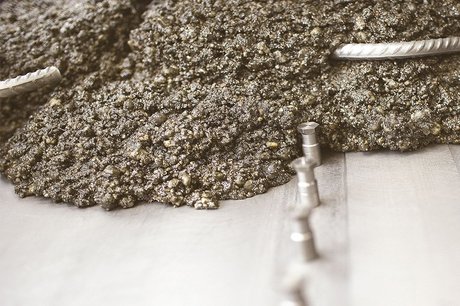
Intelligent machine bed for Factory of the Future
Industry meets IoT: As part of its Factory of the Future project, Bosch Rexroth is demonstrating how machines and plants are effectively linked with each other and the world of information technology. A machine bed made of mineral casting with integrated sensors and actuators from RAMPF Machine Systems forms the vibration-damping basis.
Groundbreaking – Factory of the Future by Bosch Rexroth
Machines and systems must fulfil ever-increasing demands on dynamics, precision, and cost-effectiveness. Whereas in the past, structure, mechanics, electronics, and software were often developed separately, present and future demands can only be met with a holistic approach.
Consequently, in-process monitoring and control of the system status via sensors and actuators is becoming increasingly important: “All components must be integrated into the overall system with regard to information technology,” says Thomas Altmann, Managing Director of RAMPF Machine Systems, a leading developer and producer of machine beds and machine bed components made of alternative materials.
In the revolutionary Factory of the Future project by Bosch Rexroth, such an intelligent machine bed made of RAMPF’s epoxy resin-bonded mineral casting material EPUMENT is being used as a solid and vibration-damping basis.
At the heart of Factory of the Future is the comprehensive networking of sensors, machines, systems, and processes – in other words, everything that generates information in the industrial environment. The objective is to establish comprehensive transparency and monitoring of the entire production system.
In addition to guide rails, dummy slides, and a linear motor, the machine bed developed by Bosch Rexroth, Balluff, Sick, Steinbeis, and RAMPF Machine Systems also integrated cooling lines and sensors, which register and influence the temperature and pressures of the cooling system during operation.
On the basis of these measurement data, changes can be detected and conclusions drawn with regard to both process deviations as well as component wear.
“One of the main factors influencing component accuracy is the deformation of the machine geometry due to thermal factors. By integrating sensors and actuators in machine beds made of mineral casting, the supporting structure reacts to changing thermal operating states and environmental conditions. Deformations are therefore not subsequently compensated, but prevented from the outset,” emphasizes Thomas Altmann.
Bosch Rexroth is presenting the Factory of the Future and the intelligent machine bed at Hannover Messe from April 23 - 27 – Hall 17, Booth A40.

In addition to its outstanding damping properties, RAMPF's EPUMENT epoxy resin-bonded material features low thermal conductivity, high isotropy, homogeneity, and media resistance, flexible modeling, non-cutting replication, innovative adhesive technology, as well as outstanding ecological credentials.
